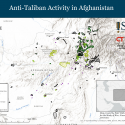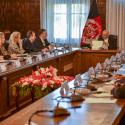Jeffrey Dressler On Possible French Withdrawal From Afghanistan
Jan 23, 2012 - AnonymousISW Senior Research Analyst Jeffrey Dressler discusses the possibility of French withdrawal from Afghanistan following the deadly shooting.
ISW Senior Research Analyst Jeffrey Dressler discusses the possibility of French withdrawal from Afghanistan following the deadly shooting.

The Taliban achieved its primary objective by taking over Afghanistan in 2021. It now presides over a weak state that is unable to address long-term socio-economic and security challenges. Supreme Leader Hibatullah Akhundzada is worsening tensions within the Taliban as he expands his power within the regime and his policies are exacerbating the economic crisis the country faces.

The Afghan Taliban has moved swiftly to consolidate control over Afghanistan and eliminate any opposition to its rule since the August 2021 collapse of the Afghan Republic. The Taliban claim to rule all of Afghanistan for the first time in 40 years. Armed groups opposed to the Taliban remain active in the country, however. Anti-Taliban groups fall into two main categories: Islamic State–aligned groups and non–Salafi-jihadi resistance groups.

The Taliban government is struggling to defeat the National Resistance Front (NRF), a growing anti-Taliban insurgency in northeastern Afghanistan. Taliban leaders appointed a new slate of military commanders to lead anti-NRF operations, indicating dissatisfaction with the previous commanders’ performance. Political and ethnic divisions are also likely undermining Taliban forces. Continued Taliban failures against the NRF could lead to the strengthening of the Haqqani Network within the Taliban’s military leadership.

Taliban Supreme Leader Hibatullah Akhundzada leveraged a recent gathering of Taliban-aligned religious leaders to consolidate power and advance efforts to implement a hardline governance program. Akhundzada is taking on a more proactive role as the Taliban navigates internal tensions and faces continued attacks from the Islamic State’s Khorasan Province (IS-KP).

IS-KP’s overarching objective remains to undermine and ultimately replace the Taliban government. IS-KP’s recent attacks are part of its effort to delegitimize the Taliban at home and obstruct its efforts to normalize its government internationally. These attacks on countries neighboring Afghanistan signal to international jihadists that IS-KP is both willing and able to attack internationally. IS-KP is also attempting to attract local Uzbek and Tajik jihadists by signaling to them that it will support their efforts against the Uzbek and Tajik governments.

Increasing numbers of anti-Taliban opposition groups are announcing their intent to fight the Taliban during an impending spring offensive. The Taliban government is redeploying its military forces and standing up new military units in order to preempt this offensive and increase security in areas that are likely to see anti-Taliban activity. These opposition groups are actively working toward setting the conditions for an offensive but the extent of their fighting capabilities remain uncertain.

Key Takeaway: Uzbek Taliban units revolted, forcibly disarmed local Pashtun Taliban units, and briefly seized control of Maimana, the provincial capital of Faryab Province on January 13. Local Taliban leadership, including the governor and police chief, fled the city while locals reported some shots fired. The revolt occurred shortly after Taliban Deputy Defense Minister Mullah Fazel Mazloom arrested a senior Uzbek Taliban commander, Makhdoom Alem, in Mazar-i-Sharif on January 12. The Taliban central leadership responded quickly to the revolt in Faryab Province by deploying additional reinforcements January 14-16, which appears to have ended the revolt. Makhdoom Alem remains in custody in Kabul. If the Taliban exclude local elites from ethnic minority groups from power, it risks increasing inter-ethnic tensions in Afghanistan, and it may not have enough forces to forcibly stop every revolt.

Large-scale prisoner releases and escapes will invigorate the global Salafi-jihadi movement at a time when it has ample opportunity to expand. Recent prisoner exchanges, escapes, and mass releases are returning thousands of insurgents to battlefields in West Africa, the Middle East, and South Asia and will accelerate the growth of several insurgencies.

The Trump Administration is attempting to deny jihadists a safe haven in Afghanistan while pursuing a negotiated end to the war there. There is also a brewing political storm surrounding the U.S. partner government in Kabul. Is the U.S. plan for Afghanistan at risk?